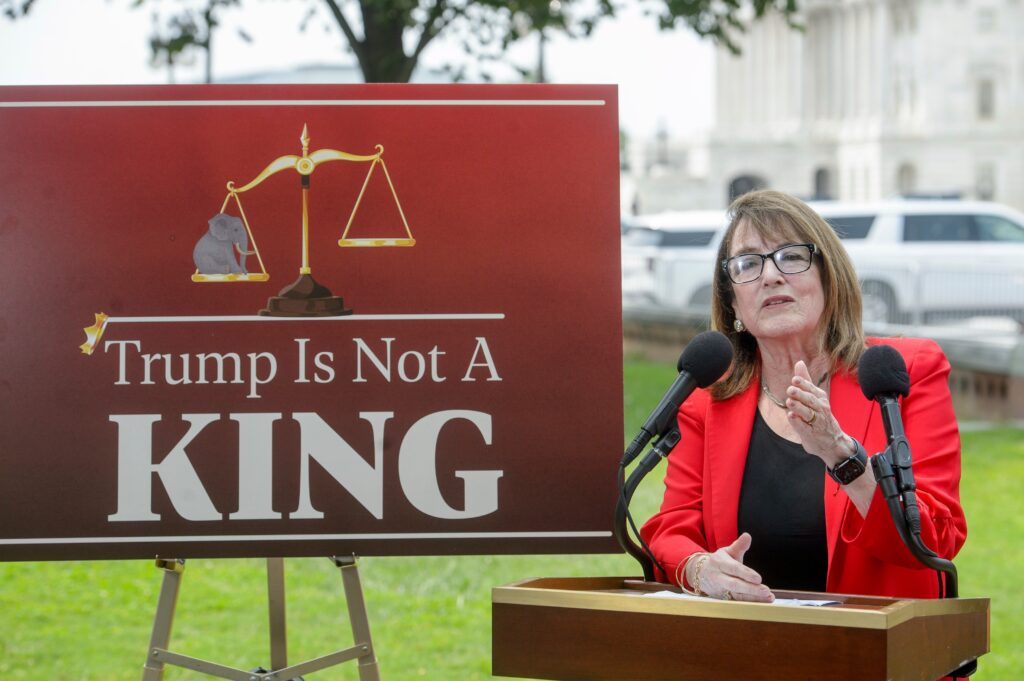When the White House blasted a federal judge as “partisan” for dismissing the criminal cases against former FBI director James B. Comey and New York Attorney General Letitia James this week, it was an attack that has become common in President Donald Trump’s second term.
For many retired federal and state supreme court judges, it was another example of the president’s assault on the judiciary and further erosion of the rule of law.
In a dozen interviews with The Washington Post, former judges and one soon-to-be-retired judge described a judiciary under incredible strain and its integrity threatened by partisan attacks, antagonistic rhetoric from public officials and ambiguous decisions handed down by the nation’s highest court.
Many judges said the politicization of judges, the Supreme Court’s expanding use of emergency dockets and sustained criticism from the Trump administration have pushed the courts and democracy to a fragile tipping point — one where cooperation with rulings and adherence to the rule of law can no longer be assumed.
“There’s not a person in our country that, whether they think about it or not, does not depend upon the ability of these fundamental rights and liberties to be protected in an action in court if there is someone who violates that,” said Paul Grimm, a retired judge for the U.S. District Court for the District of Maryland.
The consequences, judges warn, are already becoming visible in who’s willing to serve as a jurist, global shifts in judicial norms and the types of justice the U.S. system can still deliver.
Dangerous precedents and a lawless society
The judiciary is considered the weakest of the government’s three branches. It can’t enforce its orders and relies on compliance from other branches, persuasion and perception for efficacy. The former judges strongly maintain that courts are the sole backstop to power imbalances and backsliding into authoritarian government.
The White House dismissed the criticisms of the judges, citing “unlawful” lower-court rulings.
“The real threat to the rule of law are these lower court judges who are consistently ignoring the law in service of their own personal political agenda. The reality is, with over 20 Supreme Court victories, the Administration’s policies have been consistently upheld as lawful,” White House spokesperson Abigail Jackson said in a statement.
But some of them warn that Trump’s clashes with judges echo how leaders in foreign countries sought to undermine the strength of their courts — from right-wing court reforms in Hungary to attempts by Israeli Prime Minister Benjamin Netanyahu to shift power away from the judiciary.
“All you have to do is look back on what occurred in Nazi Germany,” said Barbara Pariente, a former chief justice on the Florida Supreme Court.
In 1937, judges deemed by the Nazi regime as noncompliant with its laws were replaced, resulting in an overhaul of its judicial system.
“I’m not saying that our country is close to that, but we ought to be aware … the first line of attack were on judges and lawyers,” she continued.
Judges, like many federal officials and other professions in public service, swear an oath to the Constitution, and through the power of judicial review, courts act as guardrails against unchecked power and protectors of fundamental rights.
Allyson Duncan, who previously served on the U.S. Court of Appeals for the 4th Circuit — the same circuit where a panel of judges in April denied an appeal by the Trump administration in the wrongful deportation case of Kilmar Abrego García — warned that the public often fails to see the consequences of a weakened rule of law and diminishing judicial branch until it is too late.
Without respect for the rule of law and voluntary compliance with judicial orders, Duncan said people have to understand that what happened to Abrego, the Maryland man who was improperly deported and imprisoned for more than two months in El Salvador, “could happen to them.”
‘Intimidate all the judges’
Grimm, the retired federal judge, said the Trump administration’s attempts to intimidate judges have bred fear among judges — and invoked a line from Shakespeare’s “Henry VI,” in which a henchman trying to overthrow England says: “The first thing we do, let’s kill all the lawyers.”
“That was not done because they thought lawyers were evil, bad people,” Grimm said, “but because the lawyers would prevent the people who are trying to plot the takeover of the government from doing that.”
In a twist on the play’s script, he said, “The motto today might be ‘The first thing we do, let’s intimidate all the judges.’ ”
Throughout history, judges have had their rulings met with praise or criticism by everyday people and public officials.
But under Trump, many judges and other legal experts say that dynamic has degraded into unjustified criticism, with the president using social media and public speeches to attack judges who rule against his policies. He frequently labels them as “lunatic,” “rogue,” “radical left” or “so-called” judges.
Sitting judges rarely, if ever, respond to such criticism or attacks.
“You have an easy target in judges, because most codes of judicial conduct prohibit them from responding to criticism in a public way,” said Wallace Jefferson, a Republican former chief justice of the Texas Supreme Court, who, like others, noted that judges are freed from such prohibitions upon retirement from the bench.
Although attacks on the judiciary aren’t new, the increased frequency and intensity could drive jurists from the bench earlier than in previous generations, the retired judges say.
“When I talk to former colleagues who I think would have made wonderful Supreme Court justices or federal judges, many of them say it’s not worth it,” said Janine Geske, a former Wisconsin state Supreme Court justice.
Geske, who served on that bench from 1993 to 1998, said she faced death threats and had to move her family during her career.
Unlike federal judges and court officials, who receive protection from the U.S. Marshals Service within the Justice Department, no single federal agency tracks threats against state judicial officers.
But threats against federal judges reached near-record levels in Fiscal Year 2025, according to data from the Marshals Service. Nearly 400 federal judges received threats between Oct. 1, 2024, and Sept. 30, according to the agency. That’s fewer than the 455 judges threatened in 2023 but more than any other year for which data is publicly available.
The attacks and threats, whether from disgruntled individuals or public officials, has made average routines feel fraught for judges and their communities.
When networks would send a vehicle to take Nancy Gertner, a former federal judge of the U.S. District Court for the District of Massachusetts from 1994 to 2011, from her house to the studio for a TV appearance, the common practice was never an issue — or so she thought.
“My neighbor called me hysterical the other day when he saw the mobile van because he thought that the government was surveilling me,” Gertner said. “ … They assumed that it was an aggressive government coming after me. And I had never imagined anyone would go there.”
Erosion of respect for judicial authority
Several former judges called the increase in the Trump administration ignoring, defying, or circumventing judicial decisions alarming and warned the trend severely weakens the separation of powers that has defined the United States for more than 200 years.
Shira Scheindlin, who handled some of the country’s most notorious and high-profile cases while serving as a judge for the Southern District of New York, said a recent case — in which the Trump administration tried to deploy the California National Guard to Portland, Oregon, after a judge blocked the deployment of Oregon’s guard there — illustrates the defiance.
“That’s a game,” she said.
For decades, the Justice Department has been expected to function independently from the White House to ensure impartial judgments.
But since taking the reins of the department in early February, Attorney General Pam Bondi has filed a misconduct complaint against a judge who issued a ruling against the administration, accused federal judges in New Jersey of being “politically minded” after they attempted to remove Trump’s former personal lawyer from continuing as the state’s top federal prosecutor, and she defended the department against accusations that it has been weaponized during a contentious Senate hearing.
Bondi’s departure from norms as the nation’s chief law enforcement officer exasperated former Florida Supreme Court justice Harry Lee Anstead, who served on that bench from 1994 to 2009.
“I’m sorely disappointed that the current attorney general … is not speaking up and defending judges and warning attorneys and others to be careful in their criticisms of decisions, and not let it spill over into criticisms of the individual judges,” Anstead said, referring to her use of social media and other platforms to attack or pressure judges, rather than defend the independence of the courts.
Bondi’s lieutenant, Deputy Attorney General Todd Blanche, characterized the Justice Department’s relationship with the judiciary as an adversarial one during a speech at a Federalist Society conference earlier this month.
“It is a war, and it’s something we will not win unless we keep on fighting,” Blanche said, referring to judges who ruled against the Trump administration. “ … It’s hard to get the media, it’s hard to get the American people to focus on what a travesty it is when you have an individual judge be able to stop an entire operation or an entire administrative policy that’s constitutional and allowed just because he or she chooses to do so. So, it’s a war.”
The ‘shadow docket’ and public confidence in courts
Many judges said one of the most harmful shifts away from procedural norms within the judicial branch stems from the Supreme Court’s increasing use of the emergency docket, also known as the “shadow docket.”
Unlike cases on the merits docket, which allows for fact-finding and legal arguments, emergency applications are expedited appeals to the Supreme Court requesting immediate action, often a stay of a lower-court ruling while appeals wend their way through the courts. Decisions on the emergency docket are significantly less transparent. Because the orders are typically designed to be temporary, the justices generally don’t write full opinions to explain their rulings, nor does the court say how individual justices voted.
The nation’s highest court has issued a historic rate of emergency orders throughout the second Trump administration. By June 2025, the administration filed 19 emergency applications to the Supreme Court — the same number of appeals the Biden administration filed across four years — to push back against lower-court rulings, and often succeeded.
“That makes a mockery of our system, because those cases that go to the emergency docket are not fully briefed, not fully argued, and there’s no reasoned opinion,” Scheindlin said.
Scheindlin, who in 2013 issued a 198-page ruling declaring the New York Police Department’s controversial stop-and-frisk practices unconstitutional, warned that even if a case is heard on merits years later, a delayed process could normalize “bad practices” across the government, noting that emergency docket decisions have affected people’s lives on issues such as mass government firings and immigration policies.
The shift away from standard procedures in cases creates a trickle-down effect through the court systems, according to Scheindlin. When the Supreme Court issues emergency orders without applying full legal scrutiny to Trump’s broad executive actions, lower courts are left scrambling to interpret how those orders may affect cases they are adjudicating.
“What he’s done with universities, what he’s done with law firms, what he’s done with the media … it’s changing our country,” Scheindlin said. “Our civil rights are not being protected, our voting rights, immigration rights, whatever they are, we’re losing them.”
Other judges said they’re worried the emergency docket could be perceived as a political shortcut to undo lower court rulings, set binding precedent and signal how the court will rule once fully briefed — which, the judges said, could undermine confidence in the judiciary as a whole.
“The worst thing is for the public to believe that we’re just another political entity,” said Mary Yu, who will retire from the Washington state Supreme Court in December. “We know there are political consequences, but we’re not politically motivated.”
The post Retired judges warn that the rule of law is unraveling appeared first on Washington Post.




